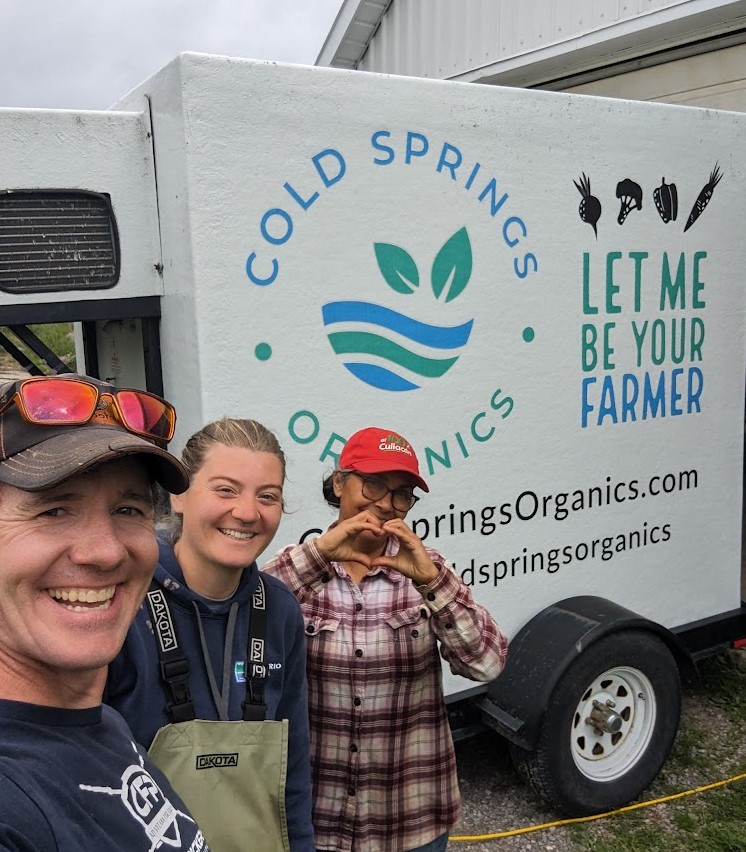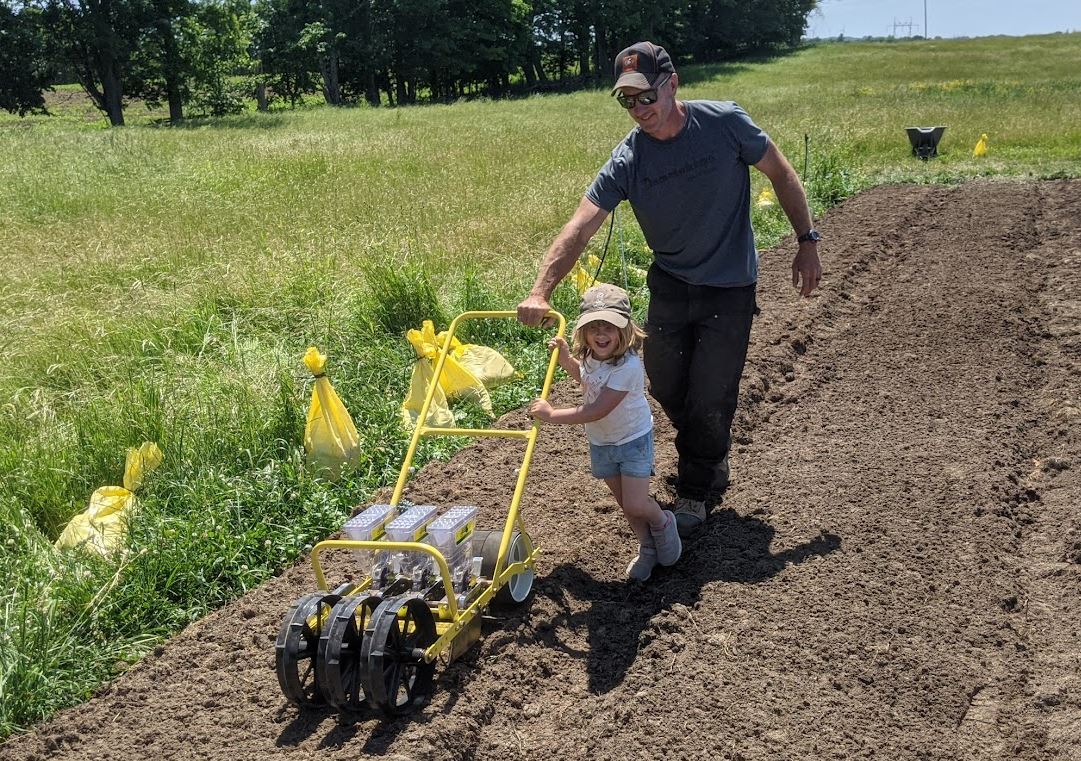From Farm to Fridge: The Journey of Real Food vs. Processed Alternatives
Do you ever wonder how the food you eat makes its way
to your table? This blog post peels back the curtain on the journey from farm
to fridge. We’ll explore the stark differences between the paths taken by
organic produce and processed foods. Understanding these routes can empower us
to make healthier, more sustainable choices.
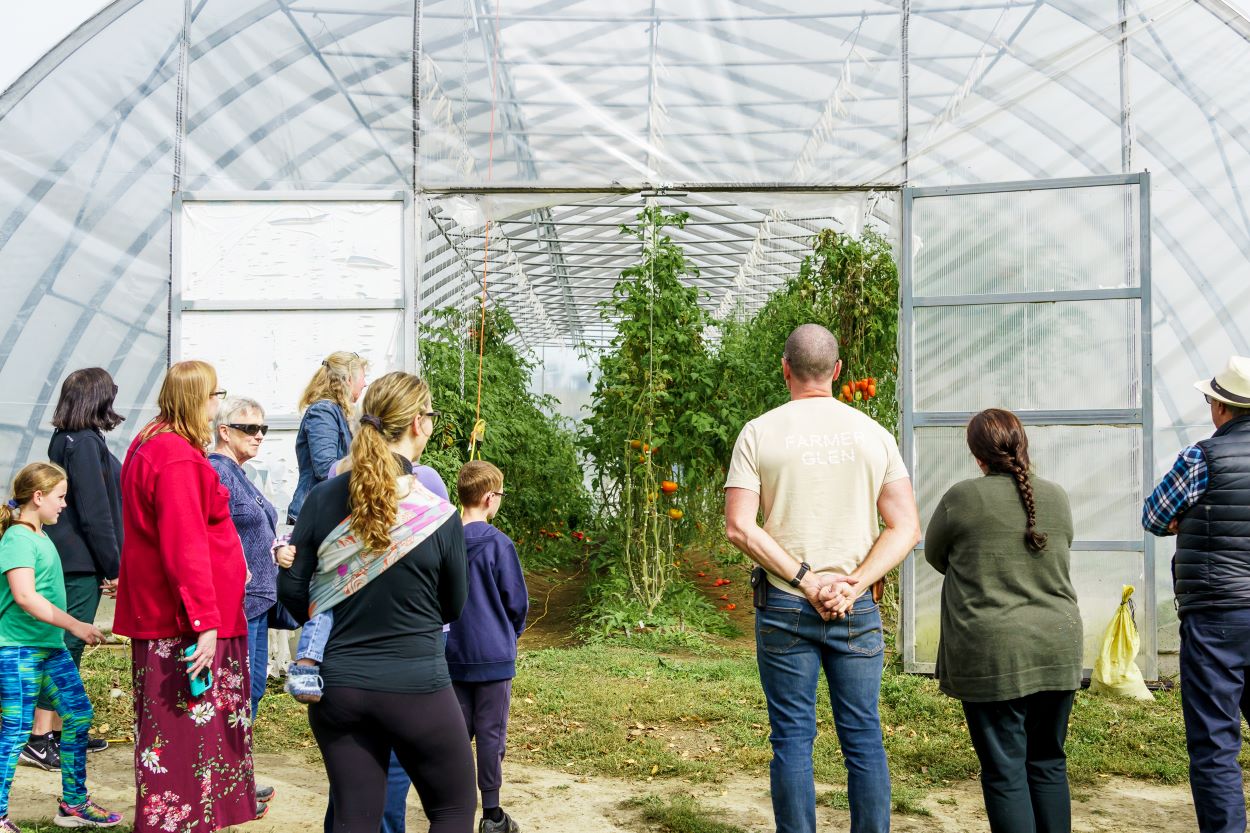
First - Organic Farming Practices
At Cold Springs Organics, our favourite part about farming is seeing how every seed planted in our soil turns into natural, wholesome, delicious nutrition for our members. We are big fans of organic farming practices that respect the earth and yield the most nutritious crops. Unlike conventional farms that rely heavily on synthetic pesticides and fertilizers, we use natural compost, organic-certified amendments and employ crop rotation and cover cropping to enhance soil fertility naturally. This not only preserves the health of our land but ensures that the food we grow is full of the nutrients your body craves.
Our approach is gentle and respectful of nature's own rhythms. We believe that the health of our soil is directly connected to the health of our plants and, ultimately, the people who eat our produce. By nurturing our land with organic matter and avoiding harsh chemicals, we help maintain a vibrant ecosystem that supports not just the crops we grow but also the wildlife that thrives around our fields.
Come to our farm and you'll see right away how the birds whole-heartily agree!
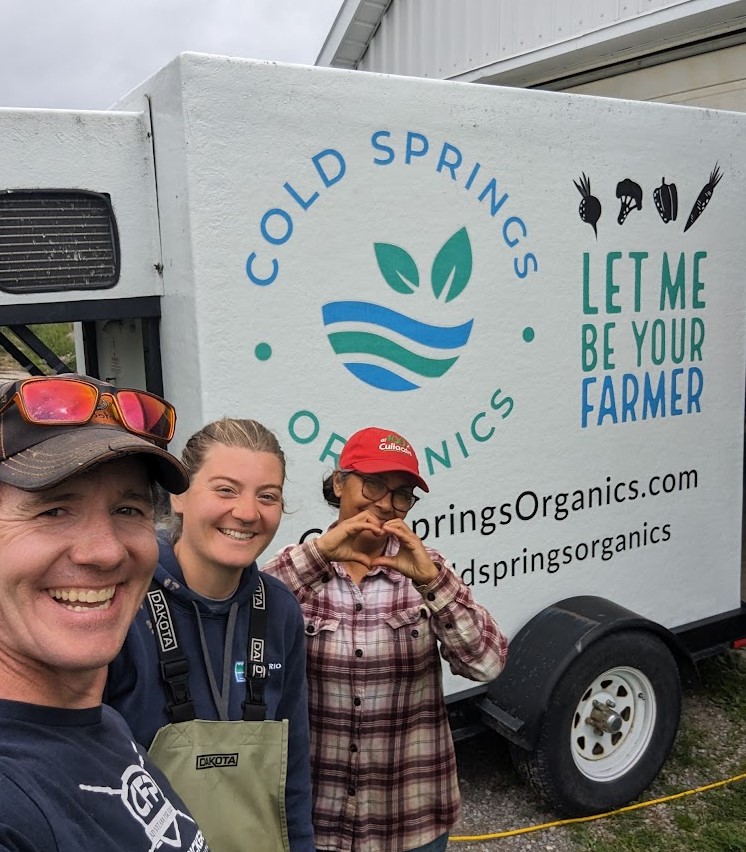
Harvesting and Local Distribution
When it comes to harvesting our crops, timing is everything. We watch our crops carefully for growth and ripeness, ensuring that each fruit and vegetable is picked at its peak. This careful timing maximizes flavour and nutritional value, something often compromised in mass-produced foods. After harvest, our produce is typically harvested the day of or the day before it is delivered and it travels a very short distance — directly to the local market or to our CSA members. We also have a refrigerated trailer to keep it cool right to your doorstep! This farm-to-table approach not only keeps our produce exceptionally fresh but also maintains its nutrient content, which can degrade with long storage periods and transportation.
Our distribution model is built on a foundation of community and local support. By keeping our food within the community, we reduce carbon emissions from long-haul transport and reinforce local economies. Our customers love knowing that the food they enjoy supports not only their health but also the local environment and fellow community members.
This journey from seed to table is transparent and rooted in our commitment to quality and sustainability. At Cold Springs Organics, we're not just growing food; we're cultivating health and community resilience, one crop at a time. Join us, and experience the difference of real, farm-fresh food that not only tastes better but is better for you and the planet.
In Contrast - The Processed Food Highway
Mass Production and Global Sourcing
The processed food industry operates on a totally different scale and philosophy. Mass production dominates, driven by the pursuit of profit and efficiency at the expense of nutritional quality and environmental sustainability. In this global system, ingredients are often sourced from the cheapest available options with no regard to geographic origin. This means a single processed food item can contain components from multiple continents, resulting in a significant carbon footprint due to transportation.
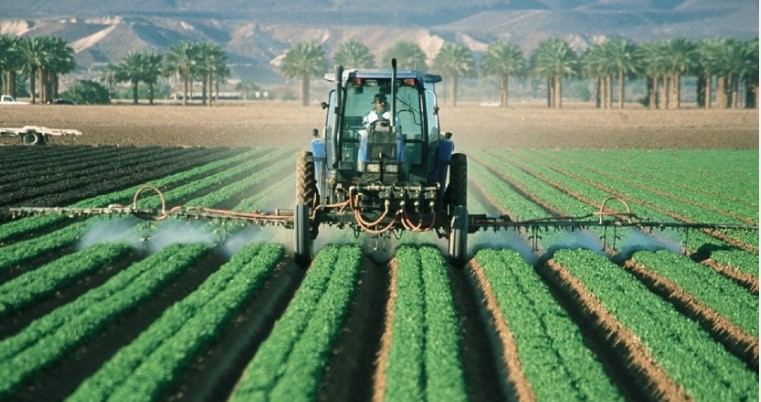
These global sourcing practices dilute the connection between us and the origin of our food, making it nearly impossible to trace the path from source to supermarket. Moreover, the heavy reliance on preservatives and chemicals to maintain shelf stability and appearance for long periods further compromises the natural integrity of the food. This black box supply chain is a stark contrast to the transparency and locality of farm-to-table models like ours at the farm.
Additives and Marketing
Processed foods are heavily dependent on additives to enhance flavour, appearance, and shelf life. You might remember my blog post based on "The Dorito Effect" by Mark Schatzker where he demonstrates how these flavouring methods have confused our 1000s of years of biological programming. These additives range from simple preservatives to complex artificial flavours and colors, many of which are engineered to heighten the product's appeal and addictiveness. The use of such chemicals can mask the inferior quality of ingredients that are far less nutritious than their fresh counterparts.
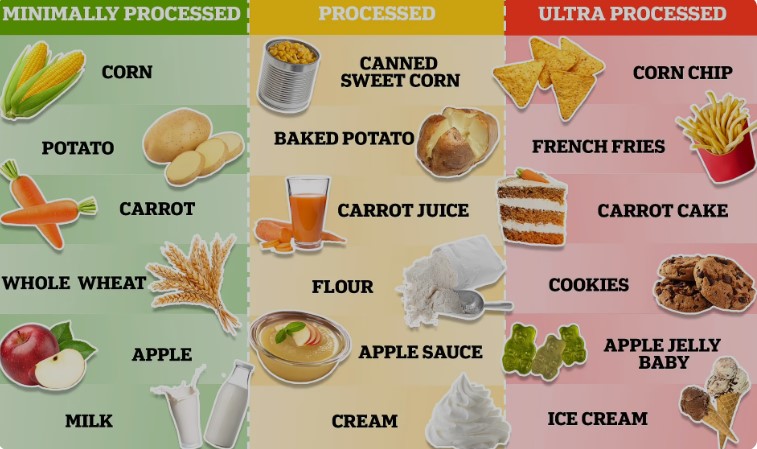
The marketing strategies employed by the processed food industry are equally engineered for maximum consumer impact. Bright packaging, bold claims about health benefits, and strategic placement in stores are designed to attract shoppers' attention and convince them of nutritional value where there may be little. These tactics are supported by enormous advertising budgets that far outstrip the investments made in improving the actual nutritional content of the products.
This approach not only misleads consumers but also fosters a dependence on convenience foods that are far removed from the nutrient-rich, whole foods our bodies inherently need. The result is a consumer base that is less informed about the origins and contents of their food, leading to dietary choices that can contribute to health issues over time.
Nutritional and Environmental Impacts
Health Implications
Have you ever stopped to wonder why we're drawn to those tempting aisles of processed foods in the grocery store, even when we're not hungry? It's because these foods are engineered to be irresistible. Packed with high levels of sugar, salt, and unhealthy fats, they tap into our primal cravings for calorie-dense nourishment—cravings that were once vital for our survival but now lead us astray in a world of abundant food. The engineers have something they call the "bliss-point" where your brain turns on and says "again"!

The nutrition field has blossomed, but it has also
revealed troubling trends directly linked to our modern diets. Processed foods,
while convenient, are often empty calories, filled instead with artificial
additives that can lead to a host of health issues, from obesity and diabetes
to heart disease and beyond. Our bodies, brilliant in their biological makeup,
are being tricked. The artificial flavours and chemically enhanced foodstuffs
are hacking our sensory system, tricking us into consuming items that are void
of real nutritional value.
Dr. Clara Davis, in her pioneering study, demonstrated that when children are offered a variety of unprocessed, whole foods, they naturally select diets that are balanced and full of the nutrients they need. Her findings challenge us to reconsider our food choices: Why feed our children—and ourselves—foods that compromise their health when the wisdom of our bodies clearly craves what is genuinely nourishing?
Sustainability and Environmental Footprint
The environmental costs of processed foods are equally alarming. Consider the long, complex supply chains that span continents, involving countless stages of production, packaging, and transportation. Each step consumes energy and emits carbon, contributing significantly to our global environmental crisis.
Contrast this with the sustainable practices of small scale agriculture, where the focus is on local and minimalistic intervention. By supporting local systems, we not only reduce our carbon footprint but also enhance the health of our local ecosystems. Our methods of crop rotation, large hedgerows, maintaining swales, organic fertilization, and minimal chemical interference allow nature to thrive, creating a farming landscape that supports biodiversity and ecological balance.
Moreover, the choices we make at the grocery store or at the dinner table ripple outward, affecting not just our immediate environment but the global community. Opting for foods that are grown and harvested with respect for the earth is a profound step toward healing our planet.
In conclusion, the path laid out by industrial agriculture and big food corporations is unsustainable and unhealthy. However, by choosing to support local, organic farms and by making informed decisions about the food we consume, we can reclaim our health and work towards a more sustainable world. The choice is ours: continue down the path of convenience at the cost of our health and the planet, or pivot towards practices that nourish our bodies and respect the earth. Let's choose wisely and teach the next generation to do the same.
Real Stories from Real People
Our community at Cold Springs Organics isn't just growing crops; we're cultivating a healthier lifestyle and forging deeper connections with our food. The testimonials from our members speak volumes about the transformative power of eating fresh, organic produce. Let's dive into some of these inspiring stories.

Al and Suzanne's Health Journey
When Al and Suzanne joined our CSA, they weren't sure what to expect. They soon discovered that being part of a community-supported agriculture program would not only change the way they eat but also improve their overall health. Now, whenever they dine out, the first thing they look for on the menu is the vegetable options. Their meal choices are inspired by what they've learned to be the freshest and most nutritious. This simple change has made them feel more energetic and vibrant.
Surprising Vegetable Love
We've heard countless stories from members who were astonished to find their children eagerly eating vegetables they previously wouldn't touch. One such story comes from a family who was shocked when their child, who had always been picky, started eating their air fryed beets! It seems that the freshness and flavor of just-picked produce can turn even the most reluctant eater into a veggie lover.
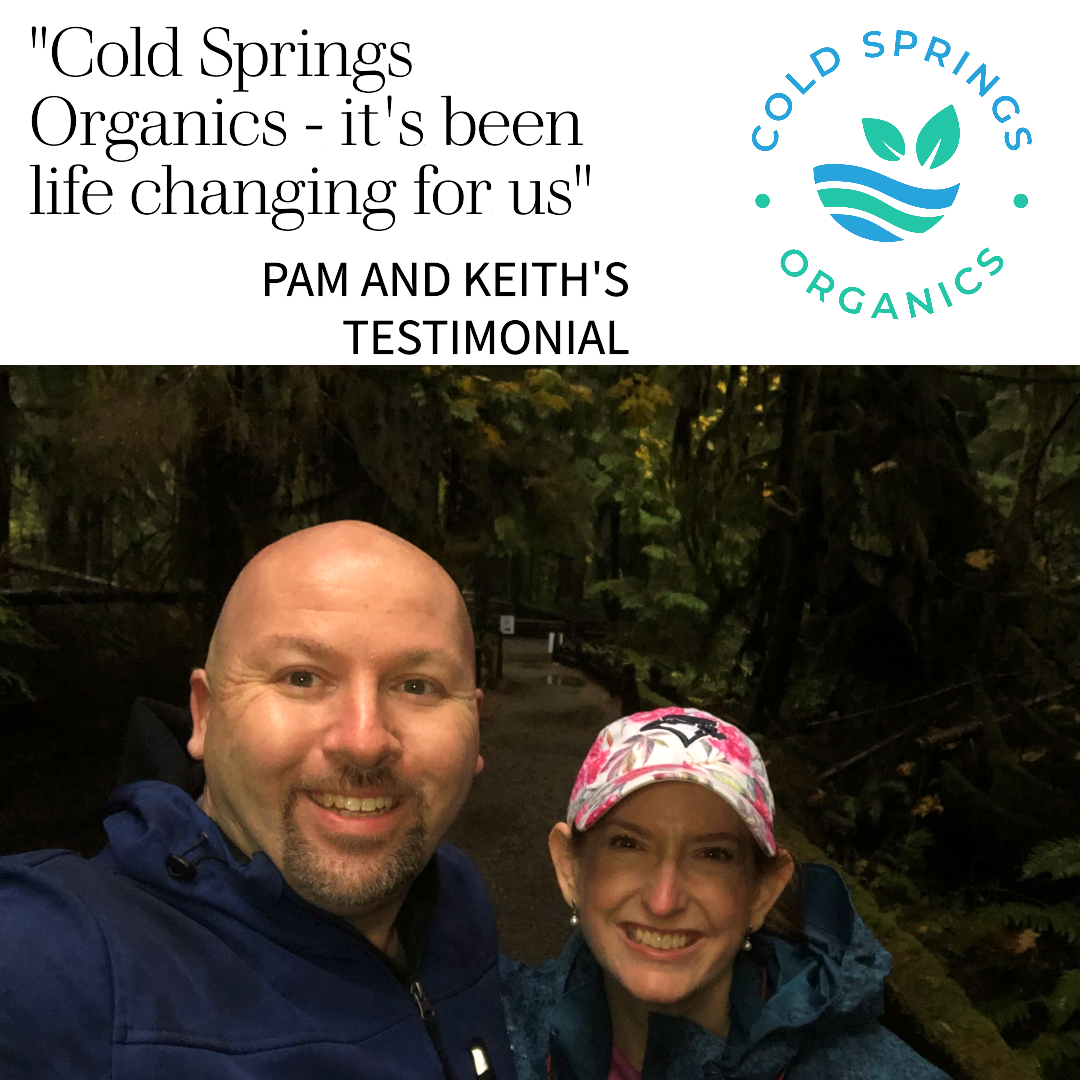
Pam's Budget Benefits
Pam, another valued member of our community, shared how joining the CSA has actually helped her family save money. By receiving a bi-weekly box of diverse vegetables and fruits, Pam doesn't have to get produce at the grocery store all season. The variety and abundance keep her family's meals exciting and diverse, all while supporting their health and wallet.
Sean and Laura's Flavor Discovery
Sean and Laura were blasé mushroom skeptics until they tried the mushrooms from Cold Springs Organics. The rich, earthy flavour was unlike anything they had bought from a store. Their kids, usually hesitant about mushrooms, eagerly ate them! This experience opened their eyes to what real, fresh food can taste like and how much of a difference it makes not just to their palates but also to their children's acceptance of nutritious foods.
Call to Action: Join the Veggie Revolution
Are you ready to experience your own veggie revolution? Imagine a diet filled with colourful, delicious, and nutrient-packed vegetables and fruits, picked at their peak and brought directly to your table. Joining a CSA with Cold Springs Organics means more than just receiving fresh produce; it's about becoming part of a community that values health, sustainability, and the joy of eating well.
Consider this your invitation to transform the way you eat, the way you think about food, and how you contribute to your local economy and the environment. Join our CSA today and witness firsthand the extraordinary benefits of getting your food from farm to fridge. Your body, your taste buds, and even your wallet will thank you. Welcome to our community—where every meal is a celebration of life and freshness!

